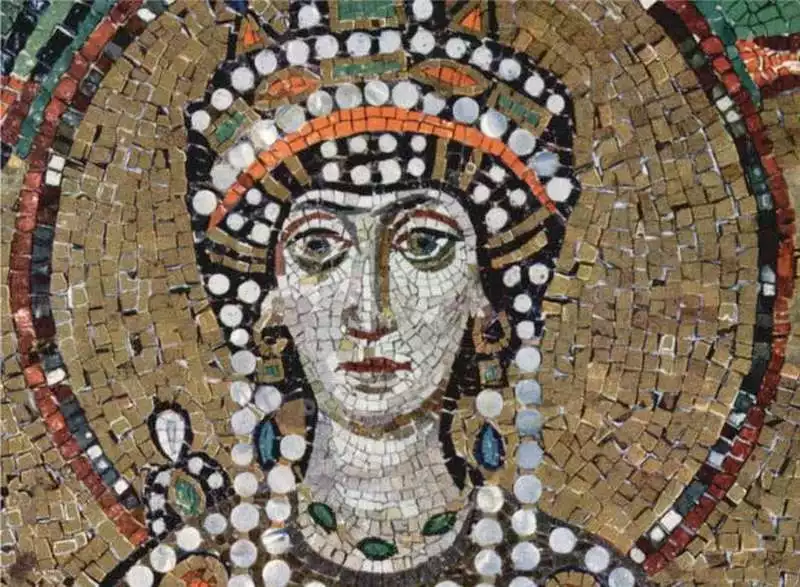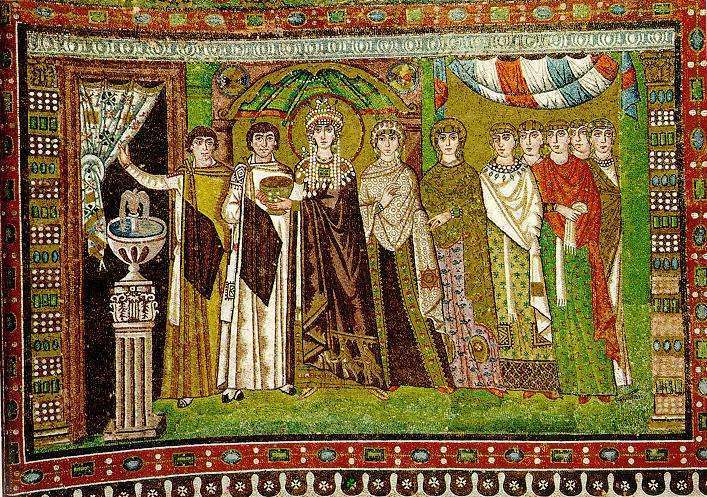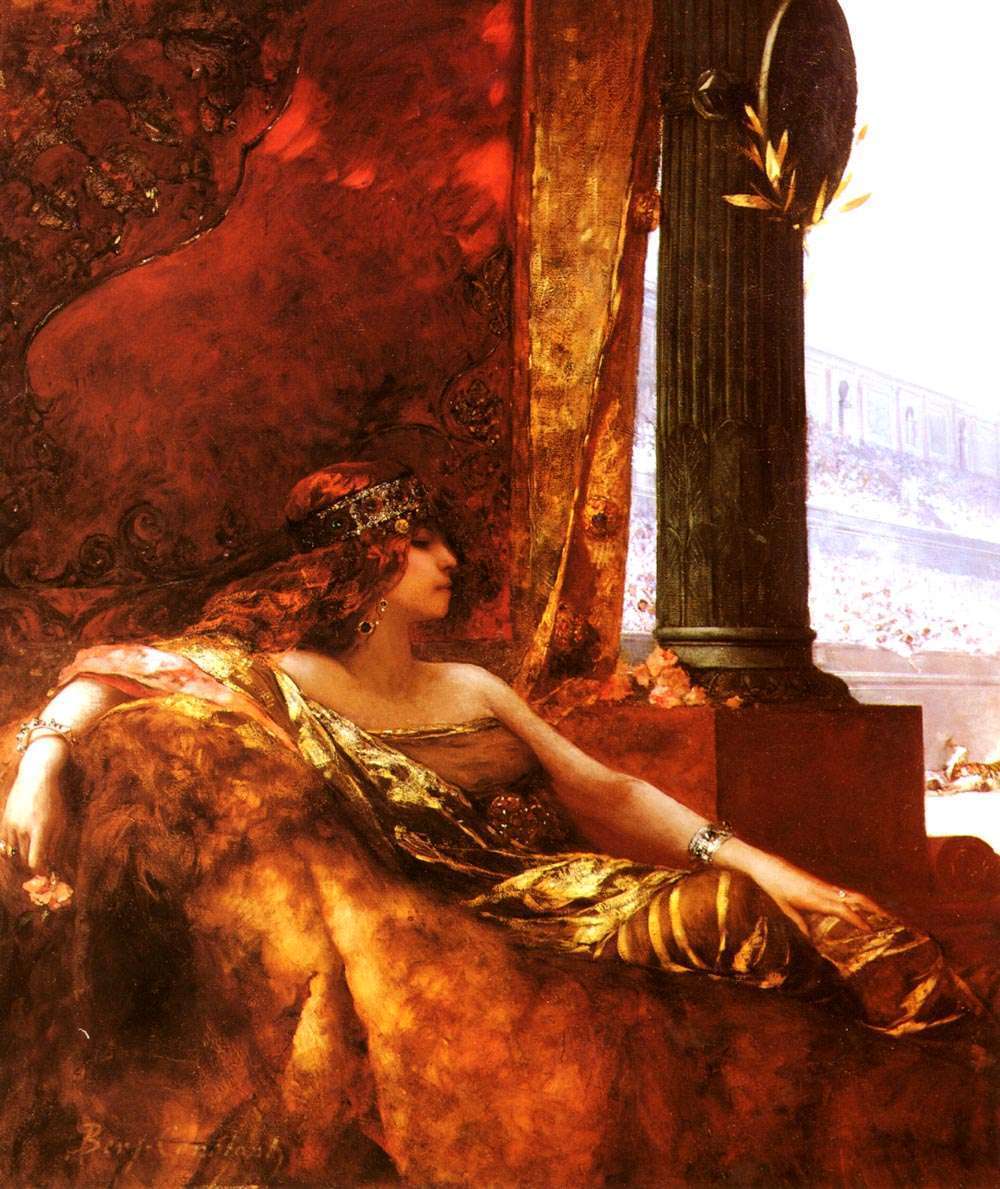
Empress Theodora, born around 500 AD and passing away on June 28, 548 AD, remains a prominent figure in Byzantine history. Her journey from humble beginnings to becoming one of the most powerful and influential empresses in the Byzantine Empire is a testament to her resilience, intelligence, and political acumen. Her life and reign alongside Emperor Justinian I significantly impacted the cultural, political, and religious landscapes of her time, shaping the empire’s future and leaving a lasting legacy on world history. Her strategic mind and deft handling of court politics enabled her to navigate through complex challenges, effectively consolidating her power and influence.
Early Life and Rise to Power
Empress Theodora’s early life was marked by struggle and perseverance. Born into a lower-class family in Constantinople, she spent her early years in an environment far removed from the grandeur of the Byzantine court. Her father, Acacius, was a bear keeper at the Hippodrome, while her mother, whose name remains unknown, navigated the challenges of raising a family in a society stratified by class and privilege.
Despite these humble beginnings, Theodora’s charisma and intelligence soon propelled her onto a path that would radically alter her destiny. Her journey from actress to empress is a remarkable story of personal transformation and ambition. This chapter of her life, often shrouded in controversy and speculation, highlights her tenacity and adaptability, traits that would later define her reign.
Theodora’s ascent to power began in earnest when she caught the attention of Justinian, then a prominent figure in the Byzantine hierarchy. Their relationship was both a romantic and a strategic alliance, with Theodora quickly becoming an indispensable partner in Justinian’s political ambitions. Their marriage in 525 AD marked a significant turning point, not only in Theodora’s life but also in the annals of the Byzantine Empire.
As empress, Theodora’s influence extended far beyond the traditional roles assigned to women of her era. She was not merely a ceremonial figure but an active participant in the governance and decision-making processes of the empire. Her keen political instincts and unwavering support of her husband played a crucial role in stabilizing and strengthening Justinian’s rule.
Theodora’s early life and rise to power, marked by dramatic shifts and unprecedented achievements, set the stage for a reign that would leave a lasting imprint on Byzantine history. Her journey from the margins of society to the zenith of imperial power is a compelling narrative of resilience and ambition, reflecting the complexities and dynamism of the era she helped shape.
Influential Reforms and Policies
Empress Theodora’s reign, alongside Emperor Justinian, was marked by significant reforms and policies that reshaped the Byzantine Empire’s social and legal landscapes. Her influence was particularly notable in advancing the rights and status of women, a revolutionary stance for her time.
One of Theodora’s most impactful contributions was her role in shaping and enacting progressive legislation that significantly improved the lives of women in the empire. She championed laws that expanded women’s rights in divorce and property ownership, and played a key role in altering the legal status of courtesans, granting them greater protection and respectability. These reforms were not only progressive but also indicative of her deep empathy and understanding of the challenges faced by women, particularly those from less privileged backgrounds.
Furthermore, Theodora was instrumental in the establishment of laws against forced prostitution and the trafficking of women. She established safe houses for women who sought refuge from abuse and exploitation, reflecting her commitment to social justice and compassion for the vulnerable. Her initiatives in this realm were pioneering, showcasing her foresight and determination to bring about meaningful change in society.
Empress Theodora’s reformative zeal extended beyond women’s rights. She was a key figure in the Nika Riots of 532 AD, displaying remarkable courage and strategic acumen in quelling the uprising that threatened the stability of the empire. Her advice and resolve during this critical moment not only saved Justinian’s reign but also demonstrated her exceptional leadership qualities and political savvy.
Theodora’s influence in policy and reform during her reign was profound. Her efforts in championing the rights of women and the vulnerable, along with her decisive role in political crises, firmly established her as a pivotal figure in Byzantine history. Her legacy in this realm is a testament to her visionary leadership and enduring impact on the empire.
Patronage of Arts and Religion
Empress Theodora’s reign was also notable for her significant contributions to the arts and religion, which played a central role in the cultural and spiritual life of the Byzantine Empire. Her patronage and devout faith were instrumental in shaping the religious and artistic landscapes of her time.
A devout Christian, Theodora was deeply involved in religious affairs, often influencing theological debates and church policies. Her support for the Monophysite movement, despite its controversy and opposition by the orthodox church, highlighted her commitment to her beliefs and her willingness to challenge the religious status quo. This involvement in religious matters not only demonstrated her piety but also her influence in shaping the religious discourse of the empire.
In the realm of the arts, Theodora was a great patron, recognizing the power of art in promoting religious and imperial ideals. Her contributions to the construction and beautification of churches and public buildings in Constantinople were significant. The Hagia Sophia, rebuilt under Justinian’s rule, benefited from her patronage. The magnificent mosaics in the basilica, some depicting Theodora herself, are enduring symbols of her legacy and the cultural renaissance she helped foster.
Theodora’s impact on religious and artistic life extended beyond mere patronage; she understood the importance of art and religion in unifying and elevating the empire. Her efforts in these areas not only enhanced the cultural richness of the Byzantine Empire but also reinforced its spiritual foundations.
Through her patronage of the arts and deep involvement in religious affairs, Empress Theodora left an indelible mark on the cultural and spiritual identity of the Byzantine Empire. Her legacy in these areas is a reflection of her multifaceted personality and her profound understanding of the interplay between art, religion, and politics in shaping the ethos of her time.
Diplomatic Influence and International Relations
Empress Theodora’s role in the Byzantine Empire also extended to the realm of diplomacy and international relations, where her influence was both subtle and profound. Her diplomatic acumen played a crucial role in shaping the empire’s foreign policy and maintaining its prominence on the international stage.
Theodora’s diplomatic initiatives were characterized by a keen understanding of the complex geopolitical landscape of the era. She was instrumental in forging alliances and navigating the intricate web of relationships between the Byzantine Empire and its neighbors. Her ability to strategically use marriage alliances, treaties, and diplomatic correspondence helped maintain the empire’s influence and deter potential threats.
One of the notable aspects of Theodora’s diplomatic efforts was her engagement with the Eastern Roman provinces and neighboring kingdoms. Her correspondence with rulers and dignitaries in these regions not only bolstered Byzantine influence but also helped in spreading its cultural and religious ideals. Theodora’s diplomatic skills were particularly evident in her dealings with the Monophysites in Egypt and Syria, where she skillfully balanced religious and political considerations to maintain stability and cohesion within the empire.
Empress Theodora’s diplomatic legacy is a testament to her strategic mind and her ability to navigate the complex world of international politics. Her contributions in this area were crucial in maintaining the Byzantine Empire’s position as a dominant power in the Mediterranean and beyond.
Legacy and Historical Significance
Empress Theodora’s legacy extends far beyond her lifetime, leaving an enduring imprint on Byzantine history and beyond. Her reign, characterized by significant reforms, cultural patronage, and diplomatic prowess, marks her as one of the most influential and formidable women in medieval history.
Theodora’s impact on the Byzantine Empire was multifaceted. Her progressive reforms, particularly in the realm of women’s rights, were ahead of their time and reflected her deep commitment to social justice. Her patronage of the arts and involvement in religious affairs contributed significantly to the cultural and spiritual richness of the empire.
Historians and scholars continue to study Empress Theodora’s life and reign, often debating and re-evaluating her role and influence. Despite the controversies and varying interpretations of her actions, there is a consensus on her exceptional leadership qualities and her ability to wield power effectively in a male-dominated world.
Empress Theodora’s story, from her humble beginnings to becoming a powerful empress, continues to inspire and fascinate. Her legacy is a complex tapestry of political acumen, cultural patronage, and enduring influence, cementing her status as a pivotal figure in the annals of history. Her life and reign offer valuable insights into the Byzantine Empire’s social, political, and cultural dynamics, making her an enduring subject of study and admiration.
Empress Theodora’s remarkable journey from humble origins to becoming one of the most influential figures in Byzantine history is a testament to her unwavering determination and multifaceted talents. Her reign, alongside Emperor Justinian I, left an indelible mark on the Byzantine Empire, shaping its social, cultural, and political landscapes in profound ways.
Theodora’s commitment to progressive reforms, particularly in advancing women’s rights and protecting the vulnerable, showcased her compassion and sense of justice. Her patronage of the arts and engagement in religious matters enriched the cultural and spiritual life of the empire. Furthermore, her diplomatic skills ensured the empire’s stability and prominence on the international stage.
As historians continue to study her life and reign, Empress Theodora remains an enigmatic and inspirational figure. Her legacy serves as a reminder of the enduring impact of individuals who challenge the status quo and champion meaningful change.
In the annals of Byzantine history, Theodora’s name stands as a symbol of resilience, leadership, and visionary governance. Her story continues to captivate and educate, offering valuable insights into the complexities of her era and the enduring power of leadership.
References
- Cameron, Averil. “The Empress Theodora: Symbol of Women’s Independence.” Journal of Feminist Studies in Religion, vol. 1, no. 1, 1985, pp. 61-73.
- Holum, Kenneth G. “Theodosian Empresses: Women and Imperial Dominion in Late Antiquity.” University of California Press, 1982.
- Khan Academy – “Empress Theodora: Rhetoric and Byzantine Primary Sources” (Accessed on December 21, 2023)
- JSTOR – “The Empress Theodora” (Accessed on December 21, 2023)
- JSTOR – “Byzantine Women and Their World” (Accessed on December 21, 2023)
- University of Texas Press – “The Empress Theodora: Partner of Justinian” (Accessed on December 21, 2023)
- University of Helsinki – “Theodora” (Accessed on December 21, 2023)
- Internet Archive – “The Empress Theodora” (Foss, Clive) (Accessed on December 21, 2023)
- ResearchGate – “The empress Theodora” (Accessed on December 21, 2023)


